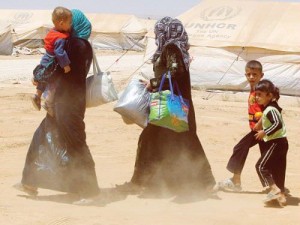 The Syrian Army stormed the village of Tal Shehab near the Jordanian border, opposition groups and activists said on Thursday, raising fears that the forces of President Bashar al-Assad may seek to cut off the torrent of tens of thousands of refugees who have been fleeing across the border.
The Syrian Army stormed the village of Tal Shehab near the Jordanian border, opposition groups and activists said on Thursday, raising fears that the forces of President Bashar al-Assad may seek to cut off the torrent of tens of thousands of refugees who have been fleeing across the border.
The move into Tal Shehab is the latest step in a sweeping military campaign carried out by aircraft and ground troops seeking to wipe out support for the uprising against Mr. Assad around its birthplace in the nearby city of Dara’a. Refugees and aid workers inside the Jordanian border near Dara’a have said that the opposition fighters operating as the Free Syrian Army have kept open as many as four border crossings for residents to flee into Jordan, but Syrian soldiers frequently shoot at the refugees and occasionally succeed in reducing the nightly exodus to just 700 from peaks that reached as high as 5,000 in 36 hours.
The Local Coordination Committees, an opposition group that tracks the violence, and the Syrian Observatory for Human Rights, an opposition group based in Britain, also reported heavy fighting in the suburbs of Damascus, where the Syrian Army is shelling neighborhoods considered havens for the opposition. They said there was street fighting and shelling in Tadamon and areas south of the city.
By early afternoon, the coordination committees reported a count of 41 bodies in the Damascus area, including 23 in the neighborhood of Zamalka and 5 in the Yarmouk camp for Palestinian refugees.
And fighting continued around Aleppo to the north; Dara’a in the south, and Deir el-Zour to the east, where the Syrian Observatory for Human Rights has said earlier in the week that rebel fighters had taken control of parts of an airport.
Altogether, the coordination committees said it had reports as of Thursday afternoon of 67 dead across Syria.
The fighting took place as three United States senators were completing a visit to Iraq where they pressed its top government officials for support in the effort to topple Mr. Assad. Iraq, with a Shiite Muslim majority that may look warmly toward Shiite Iran and the Shiite-allied Alawite sect around Mr. Assad, has reportedly allowed Iranian airplanes to cross Iraqi airspace carrying supplies to the Assad government in potential violations of an arms embargo, although Iraqi officials say the Iranians have assured them any Iranian cargo is nonmilitary.
“The U.S. must make real our strategic partnership w/Baghdad, esp. as Syria crisis worsens,” Senator Joseph I. Lieberman, independent of Connecticut, wrote in an online posting after meeting with the Iraqi prime minister, Nuri Kamal al-Maliki, and Foreign Minister Hoshyar Zebari. Mr. Lieberman was accompanied by his customary traveling partners, the Republican senators John McCain of Arizona and Lindsey Graham of South Carolina — fellow hawks who call themselves “the three amigos.”
“It’s clear Assad’s killing campaign threatens the whole region,” Mr. McCain wrote in an online message of his own. The day before, President Mohamed Morsi of Egypt warned Mr. Assad that “your time won’t be long,” as Syrian warplanes and artillery shelled the battleground city of Aleppo and opposition groups reported heavy fighting around the Euphrates River city of Deir el-Zour.
Mr. Morsi, an Islamist and Egypt’s first democratically elected president, fired back at Mr. Assad just days after the top Syrian government spokesman said that the only change in Cairo since the ouster last year of Hosni Mubarak was Mr. Morsi’s beard. Mr. Morsi has called for nations to come together to support the Syrian opposition and end the bloodshed. His warning added to the acrimony in the region as the Syrian civil war continues to spill blood and pour out refugees.
Mr. Morsi, speaking at an Arab League meeting in the Egyptian capital, urged Mr. Assad to heed the lessons of “recent history” — the overthrow of dictators in Tunisia, Libya, Yemen and Egypt. Step down while you can, he told Mr. Assad.
“There is still a chance to stop the bloodshed,” Mr. Morsi said. “There is no room for stubbornness. Don’t listen to the voices that tempt you to stay.”
NY Times

Leave a Reply
You must be logged in to post a comment.